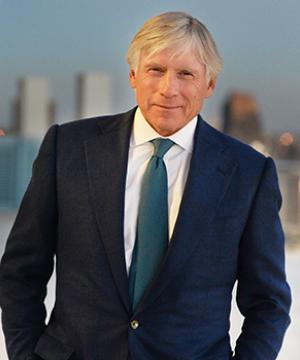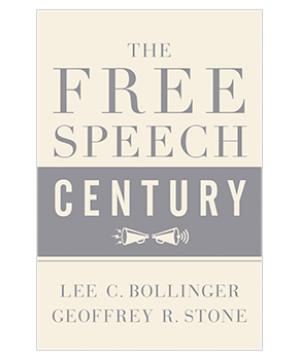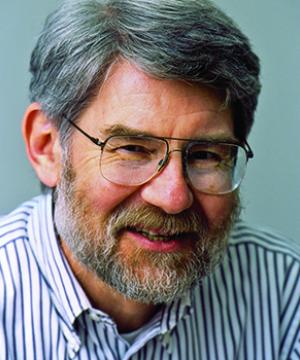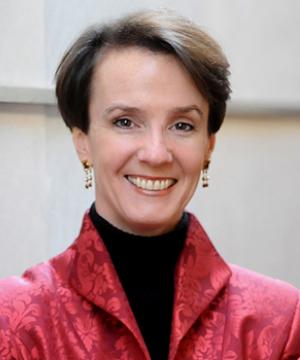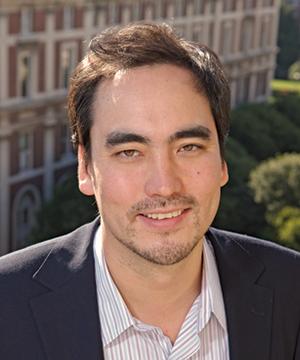The Free Speech Century: How the First Amendment Came to Life
Progress was halting and the boundaries of legal expression remain contested, yet over the decades that followed the United States became “the most speech protective of any nation on Earth, now or throughout history,” writes Columbia University President Lee C. Bollinger ’71, the Seth Low Professor of the University and longtime member of the Law School faculty, in a new book, The Free Speech Century (Oxford University Press).
The book appears on the 100th anniversary of Schenck v. United States and two other criminal cases under the Espionage Act—seminal free speech cases in an era characterized by fear of immigrants, growth in white nationalism and a popular push for limits on political dissent. Co-edited by Bollinger and a fellow First Amendment scholar, University of Chicago law professor Geoffrey R. Stone, the book’s themes resonate in our current moment. Bollinger, who continues to teach a popular law course for Columbia undergraduates each year, previously collaborated with Stone on Eternally Vigilant: Free Speech in the Modern Era (University of Chicago Press).
The Free Speech Century features 16 essays by an array of pioneering legal scholars and respected practitioners, including Columbia Law professors Vincent Blasi, Sarah Cleveland, and Tim Wu. The eclectic mix of essays, along with an introductory and concluding dialogue between Bollinger and Stone, explore the development of First Amendment doctrine that flowed from the 1919 cases, its global influences, current disputes and especially new threats to free expression in the digital, social media age.
As Bollinger, who grew up in a family that worked at and published small-town daily newspapers in Santa Rosa, Calif. and Baker, Ore., concludes, the century-long saga of free speech in America is a grand one, “with a broad set of narratives and stories that are Shakespearean in their dramatic engagement.”
In a chapter entitled “Rights Skepticism and Majority Rule at the Birth of the Modern First Amendment,” Vincent Blasi, Corliss Lamont Professor of Civil Liberties, traces the emergence of speech protections in the early 20th century through the work of three legal giants: Learned Hand, Oliver Wendell Holmes, and Louis Brandeis. Troubled by governmental persecution of wartime dissidents, each would find a way, Blasi writes, to reconcile “a robust right of free speech” with majority rule.
Holmes, even as he upheld a conviction in 1919 for anti-draft counseling, set forth an enduring limit on prosecutions: that the offending speech must present a “clear and present danger.” Later that year he wrote, in a dissent for the ages, that society is best served by the “free trade in ideas.”
Brandeis famously wrote in 1927 that liberty is “indispensable to the discovery and spread of political truth” and that, except in an emergency, the remedy for evil speech is “more speech, not enforced silence.”
Protection of unpopular speech is, of course, more universally accepted today. But in some recent Supreme Court decisions, Blasi argues, including those striking down campaign finance regulations, conservative Justices have ruled for individual liberty while dismissing arguments about the impact on the functioning of democracy. By positing personal freedom as an end in itself, Blasi writes, this approach “represents a departure from the teachings of Hand, Holmes, and Brandeis.”
In her chapter, “Hate Speech at Home and Abroad,” Sarah Cleveland, the Louis Henkin Professor of Human and Constitutional Rights and a member of the United Nations Human Rights Committee, examines the development of hate-speech provisions in international law and how they have diverged from American legal doctrine, permitting more stringent controls on advocacy of racism or violence.
Still, Cleveland writes, American diplomatic advocacy has had a moderating influence on hate-speech provisions in international law, provisions that can bring outside scrutiny to bear on governments that misuse hate-speech laws to stifle legitimate dissent. American protection of free speech “has fundamentally informed the shape of international human rights treaty protections, including in the context of hate speech,” Cleveland writes. “It continues to exert a constraining influence on treaty interpretation and jurisprudence, and it continues to serve as a magnetic force in countering global political and social currents that would erode protections for freedom of expression.”
“Is the First Amendment Obsolete?” is the provocative question posed by Tim Wu, Isidor and Seville Sulzbacher Professor. Wu does not question the continued need to protect dissidents and the press from state sanctions. But with a free-wheeling internet and information overload, he says, what is scarce is not speech but listener attention, and expression is increasingly thwarted by indirect methods not addressed by First Amendment strictures.
It is fair to ask, Wu writes, whether the First Amendment should remain confined to its familiar place, protecting speech and the press from government action, while other legislative solutions are pursued (a tricky proposition anyway because regulations are likely to face First Amendment challenges). But he wonders whether the scope of the First Amendment, too, might be broadened.
If a President encourages online mobs to silence on a critic, for example, might this be a First Amendment violation under the doctrine of “accomplice liability?”
Other legislative answers might pass Constitutional muster, Wu suggests, including stronger enforcement of cyberstalking laws; new anti-trolling laws that punish credible threats, not mere statements of political views; bans on acceptance of foreign money by media platforms, and requiring media sites to police fake users and remove propaganda bots.
“To handle the political speech challenges of our time,” Wu writes, the First Amendment must be interpreted to permit “measures that protect some speakers from others.”
Bollinger notes in the book’s epilogue that “…our most memorable and consequential decisions under the First Amendment have emerged in times of national crises, when passions are at their peak and when human behavior is on full display at its worst and at its best, in times of war and when momentous social movements are on the rise. Freedom of speech and press taps into the most essential elements of life—how we think, speak, communicate, and live within the polity. It is no wonder that we are drawn again and again into its world.”
# # #
Published on December 3, 2018
